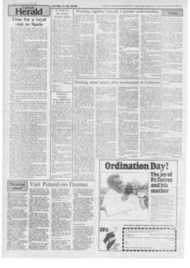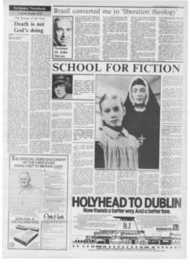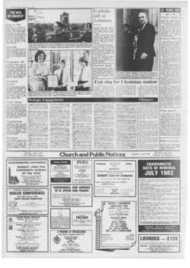Page 10, 25th June 1982
Page 10

Report an error
Noticed an error on this page?If you've noticed an error in this article please click here to report it.
Tags
Share
Related articles
End Of A Newspaper
Visiting The Curious World Of The Liturgically Correct
The Nazi War Effort Was Undone By Incompetence
Battles Of Hastings
Not A Time For The Faint Of Heart
Charterhouse Chronicle
MAX HASTINGS, writing mainly for the Standard, although most of Fleet Street has been using his pooled dispatches, seems to be being singled out as the star war correspondent of the Falklands campaign, and he has certainly reported with distinction.
The Standard described him justly as "in the great tradition". He is also the second generation of a family tradition, because his father, Macdonald Hastings. was the correspondent of Picture Post in World War II.
By a very much longer tradition the Hastings have been a Catholic family.
In a book published 11 years ago, Macdonald Hastings described himself as a "lapsed" Catholic, but said also: "Saintly men and women in my family outnumber the sinners." He recalled that his great grandfather taught in the Jesuit foundation at Georgetown, Virginia, at the time of the Civil War, and had a brother at Georgetown, Virginia, at the time of the Civil War, and had a brother who became a Jesuit but died before he could be ordained.
Two brothers of his great great maternal grandmother were Jesuits in the United States.
There were nuns in several generations of the family. His grandfather and his father went to school at Stonyhurst, as he did himself.
His favourite uncle, Major Lewis Hastings, MC, was there, too, and also contributed to the other family tradition as a famous BBC military commentator in World War II. Macdonald Hastings called his book, Jesuit Child, and declared firmly that this was what he was.
In the true tradition
THE PRODUCTS of Catholic schools have a very notable record of gallantry in Britain's wars.
One could compose a very long list from the Jesuit schools alone, perhaps starting with the fact that the first Victoria Cross of World War I was awarded to a Stonyhurst boy, Lieutenant Maurice Dease, and that Major Andrews, who won the first VC of World War II, was also at Stonyhurst.
Catholics seem to have been good at describing the wars, too.
I suppose the most distinguished Catholic war correspondent was Philip Gibbs, who was knighted for his work in World War I. He was also a novelist, of course.
Another such was Douglas Newton, his contemporary and friend, whose first novel, War, came out just before the outbreak of the Kaiser's war. Fr. Robert Hugh Benson (who was not yet a Monsignore) wrote in its preface, "This book will be called sensational and disgusting.
That is precisely what it is, because it is an account of the sensational and disgusting thing called War ..." In recent years this book has been rediscovered by some of the military historians and praised for its prescience.
When the war came, Douglas Newton was one of a number of officers called in by the War Office to write about it on their behalf.
Many years later. he told me that his closest colleagues in this chore were A. A. Milne and J. B. Morton, who was later to be famous as Beachcomber and also became a Catholic.
He said that, at that tim Morton had two preoccupations, the desire to get back to his proper unit and anxiety about keeping his hand in as a poet; and that he wrote a poem a day, and pasted it on his office wall, nearly papering the entire room with verse before he got away.
Morton, too, wrote his war novel, The Barber of Putney, which came out in 1934. Without concealing horrors, it presented a contrast to a number of rather hysterical war novels that were then appearing.
What the Lady saw
THINKING about these things, it occurred to me that,
of course, it isn't only in words that war can be searchingly described, and war artists have made a telling contribution.
I was struck by the thought that the painter of war who has made the greatest impact on the British public was not only a Catholic but a woman, Lady Butler, the elder sister of the Catholic poet, Alice Meynell.
I suppose that nowadays reproductions of her pictures of the battles of the 19th Century British are known to thousands to whom her name means nothing.
There was a time when they were common on classroom walls in many a school; but I doubt if you would find any in such a place now.
Yet they do not, in fact. glorify war, and to do so was certainly not their intention, although they do present courage and patriotism as virtues, which has not recently been fashionable.
Lady Butler, born Elizabeth Thompson, spent a great deal of her youth with her family in Italy, and carried out some of her studies in Rome. copying pictures in the churches, and her first exhibited work, which had Our Lady and St Elizabeth as its subject, was shown at a Vatican exhibition.
She became a Catholic later — about 1873 — following her
mother and younger sister into the Church; and it was the year after this that she became a household name when her picture, The Roll Call, was exhibited at the Royal Academy in London.
It was a "subject" picture in the manner of the time, showing survivors of a Guards battalion answering their names after an action in the Crimean winter.
Its success was probably partly a result of the current martial fervour in the country. Queen Victoria bought it from its original purchaser, and it is now somewhere in St James's Palace.
It was also sent to the bedside of the then ailing heroine of the Crimea, Florence Nightingale.
Certainly this first great public success was heavily charged with sentiment. But what the more discerning, including some of the recognised critics, praised was the picture's visual accuracy and so nbre realism. The Army, too, acknowledged that this young woman had somehow got all the details right, all the bits and buttons that were so important to them.
The public impact was similar that of some of the most famous press pictures taken by cameramen in more recent wars; and it is perhaps worth speculating as to how much the compositional instincts of these photographers and, indeed, of
I I S..
Lady Butler and her imitators.
Something akin to the kind of criticism one gets from modern art critics came from Ruskin a year later when he saw her Academy picture, "Quatre Bras", which went back a bit in time to portray the British 28th Regiment of Foot receiving a French cavalry charge in a field of rye two days before Waterloo.
He confessed to initial prejudice — "partly because I have always said that no woman could paint, and secondly because I thought what the public made such a fuss about must be good for nothing."
But he went on to praise the picture's "fi.ie pre-Raphaelite" quality and "the truth of its frantic passion with gradations of colour and shade of which I have not seen the like since Turner's death."
With the current revival of intelligent interest in Victorian English painters it seems to me not unlikely that embarrassment about Lady Butler's subject matter may be overcome, and that modern critics might begin to consider her again. There is a lot in what Ruskin said about her.
Answered prayer
TO GET BACK to the Falklands, several people — all non-Catholics, as it happens — have told me that they see the swift victory there, and the end it has brought to the killing, as an answer to the prayers of peace that the Pope urged on us all during his visits here and in Argentina.
Well, why not? At any rate, both countries now have a pause in which to ponder the Pope's wider condemnation of modern war, his urgent injunction in both countries that it is no longer an acceptable way of solving disputes, and should not be on the agenda of the future.
In these days of counting the cost, both the Argentines and ourselves are given greater reason said and for praying and working to prevent a continuation of the sickening business and further bloodshed.
Positive results
WHILE THE Pope was in Britain, one of the conventional things to say was that we would not be able to judge his visit's real effects until the excitement and sensation of it had died away.
Positive results might then begin to emerge. Well, I know of one place, Seaford, in Sussex, where they are already emerging, and the impetus has been provided by non-Catholic Christians.
The parish priest there, Fr. Kenneth McCarthy, has told his parishioners at the church of St Thomas More that a "beautifullywritten scroll" has been handed to him by the congregations of the Anglican churches in the town, St Leonard's and St Luke's, containing a message which says: "Thank you sincerely for the sheer joy for the visit of His Holiness Pope John Paul II to this country. Thank you for showing us how to celebrate, for showing to the world 'The Joy of the Lord', for creating acts of Christian witness, the like of which has never been seen before in this country. We were thrilled and greatly excited by it all and believe that things will never be quite the same again.
"We-would desire and determination for Christian unity and hope that as a result of this memorable visit, we may strive to find ways of sharing and deepening the relationships between our churches here in Seaford. We would welcome the opportunity to discuss these matters with you. — Yours in Christ with grateful thanks ..."
Everyone at St Thomas More's is deeply gratified by this approach. When Fr McCarthy reprinted it in the parish news letter, he described it as "a most encouraging, uplifting and generous message", and reproduced at the top of it a little drawing of the old St. Leonard's church, the largely Norman building in which once all Seaford's Christians worshipped. He said that when he read the message before Sunday sung Mass several people later told him that they had wanted to stand up and applaud.
He told the parishioners: "If Pope John Paul had known before setting out for Britain that just one such letter would be sent in just one town in England as a result of his visit both he and the Archbishop of Canterbury would have been reassured that what was about to happen was of God."
He said the message was not only a charming compliment but a call for action that must not go unheeded, and the parish must lose no time in considering its response. In fact, the Parish in Council is to do that on July 7.
to report on visible results of the Pope's visit? Such news could make some interesting paragraphs in Charterhouse.
blog comments powered by Disqus











